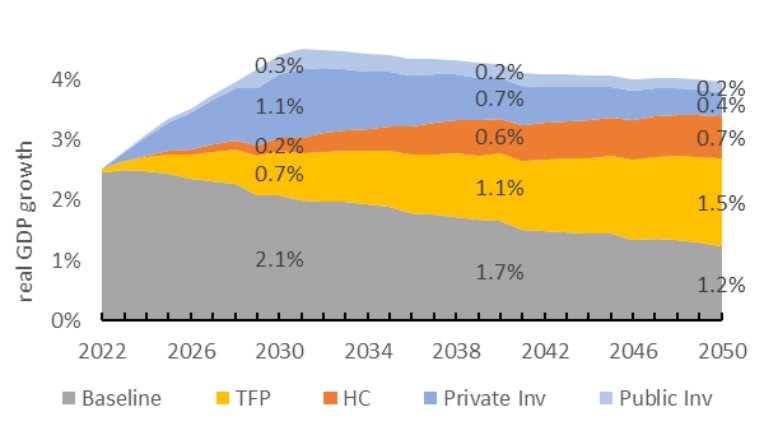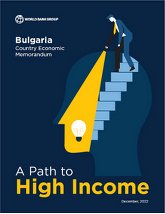The World Bank’s latest Country Economic Memorandum outlines a path for Bulgaria to reach high income status in just 15 years.
Bulgaria has been a European Union (EU) member state since 2007 but remains the country with the lowest GDP per capita in the union. Yet with the right mix of reforms, the country could reach high-income status in less than two decades. This is the main conclusion of the latest Country Economic Memorandum, prepared by the World Bank following careful analysis of the challenges and opportunities for the country’s long-term economic growth.
The report concludes that average income levels can reach parity with the rest of the EU in 15 years if annual average economic growth doubles to over 4 percent annually. For that to be realized, however, Bulgaria needs to boost productivity by enhancing the efficiency of firms and the skills of its population (See Figure 1).
Bulgaria’s EU accession raised expectations that living standards would rapidly rise and match average EU levels in a relatively short time span. Bulgaria’s reform momentum was initially robust and rapid. However, following a series of external crises, starting with the global financial crisis and more recently the COVID-19 pandemic and Russia’s invasion of Ukraine, progress slowed, and the pace of EU income convergence dampened. The fundamental drivers of long-term growth also decelerated, with demographic trends rapidly worsening in the 2010s, while investment ran into diminishing returns as the country became richer. Without a new reform impetus, growth is projected to decelerate further, to 1.2 percent by 2050, as demographic trends cause a sharp decline in the working age population and total factor productivity (TFP) growth reverts to its medium-term trend.
Figure: Bulgaria’s faster growth requires new policies, boosting people’s skills and firms’ efficiency
Ambitious reforms boosting total factor productivity, human capital, and investment growth can reverse the projected slowdown of growth to 1.2% by 2050 under a no-reform scenario.
Bulgaria currently stands at a crossroads. Boosting long-term growth is critical for the country, but what will it take? First, the CEM argues that accelerating investment and efficient absorption of EU funds can speed up long-term growth and promote the greening of the economy. If Bulgaria maintains high levels of public investment by effectively absorbing EU funds and increases the share of private investment in GDP to 25 percent of GDP, annual GDP growth is projected to rise by 0.8 percentage points (pp) on average in 2022-2050. Second, faster growth calls for strengthening inclusion by addressing the current skills shortages and promoting equality of opportunity to accelerate human capital and labor productivity growth. If Bulgaria implements ambitious education and health reforms, bringing human capital – especially the quality of education – to the level of the top performers in Central and Eastern Europe, annual GDP growth is projected to increase by 0.4pp in 2022-2050. Third, faster private sector productivity growth can be realized by further advancing the efficiency of market mechanisms. If Bulgaria addresses the institutional shortcomings that misallocate resources to less productive firms – such as the weak enforcement of competition, including in public procurement – total factor productivity could increase at a rate of up to 2 percent per year after 2030, which will lift annual GDP growth by 0.9pp on average over the 2022-2050 period.
Unleashing Bulgaria’s full productive potential through policies and institutional reforms that level the playing field among all economic agents in the country would pave the path to high income and provide a prosperous future for its people. Success requires ambitious reforms that promote human capital development as well as institutional independence and accountability to foster productivity growth. Countering the demographic trend through advancing equality of opportunities and nurturing human capital is a primary task. It also requires deep reforms in the education system towards skills development and ensuring equal access to quality public services throughout the territory.
Ensuring the enforcement of competition rules and openness of public procurement to competition will contribute to faster productivity growth and improve resource allocation. Institutional change towards building capacity, ensuring independence, and promoting transparency and accountability of public agencies is thus a key transformational pathway towards Bulgaria’s transition to high income. By implementing ambitious structural reforms in these areas, the Bulgarian economy has every chance to achieve growth rates that are at least twice as high as those achieved in the decade prior to the COVID-19 pandemic, and real incomes can converge to the average EU level in about 15 years.
Click here to learn more:
Bulgaria Country Economic Memorandum "A Path to High Income"



